Ministry+of+Science+and+ICT
-
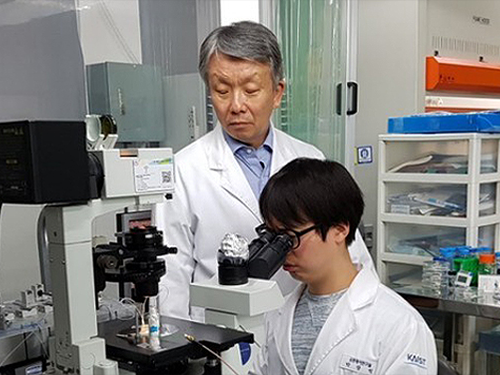 Scientist of November, Professor Hyung Jin Sung
Professor Hyung Jin Sung from the Department of Mechanical Engineering at KAIST received a ‘Science and Technology Award of the Month’ given by the Ministry of ICT and Science and the National Research Foundation of Korea for November 2017. He developed technology that can exquisitely control a micrometer-scaled liquid drop on a dime-sized lab-on-a-chip. With his work, he was recognized for reinforcing research capability on microfluidics.
Lab-on-a-chip is an emerging experiment and diagnostic technology in the form of a bio-microchip that facilitates complex and various experiments with only a minimal sample size required. This technology draws a lot of attention not only from medical and pharmaceutical areas, but also the health and environmental field. The biggest problem was that technology for the temperature control of a fluid sample, which is one of the core technologies in microfluidics, has low accuracy. This limit had to be overcome in order to use the lab-on-a-chip more widely.
Professor Sung developed an acoustic and thermal method which controls the temperature of a droplet quickly and meticulously by using sound and energy. This is a thermal method that uses heat generated during the absorption of an acoustic wave into viscoelastic substances. It facilitates a rapid heating rate and spatial-temporal temperature control, allowing heating in desired areas. In addition, Professor Sung applied his technology to polymerase chain reactions, which are used to amplify DNA.
Through this experiment, he successfully shortened the reaction time from 1-2 hours to only three minutes, making this a groundbreaking achievement.
Professor Sung said, “My research is significant for enhancing the applicability of microfluidics. I expect that it will lead to technological innovations in healthcare fields including biochemistry, medical checkups, and new medicine development.”
2017.11.03 View 8095
Scientist of November, Professor Hyung Jin Sung
Professor Hyung Jin Sung from the Department of Mechanical Engineering at KAIST received a ‘Science and Technology Award of the Month’ given by the Ministry of ICT and Science and the National Research Foundation of Korea for November 2017. He developed technology that can exquisitely control a micrometer-scaled liquid drop on a dime-sized lab-on-a-chip. With his work, he was recognized for reinforcing research capability on microfluidics.
Lab-on-a-chip is an emerging experiment and diagnostic technology in the form of a bio-microchip that facilitates complex and various experiments with only a minimal sample size required. This technology draws a lot of attention not only from medical and pharmaceutical areas, but also the health and environmental field. The biggest problem was that technology for the temperature control of a fluid sample, which is one of the core technologies in microfluidics, has low accuracy. This limit had to be overcome in order to use the lab-on-a-chip more widely.
Professor Sung developed an acoustic and thermal method which controls the temperature of a droplet quickly and meticulously by using sound and energy. This is a thermal method that uses heat generated during the absorption of an acoustic wave into viscoelastic substances. It facilitates a rapid heating rate and spatial-temporal temperature control, allowing heating in desired areas. In addition, Professor Sung applied his technology to polymerase chain reactions, which are used to amplify DNA.
Through this experiment, he successfully shortened the reaction time from 1-2 hours to only three minutes, making this a groundbreaking achievement.
Professor Sung said, “My research is significant for enhancing the applicability of microfluidics. I expect that it will lead to technological innovations in healthcare fields including biochemistry, medical checkups, and new medicine development.”
2017.11.03 View 8095 -
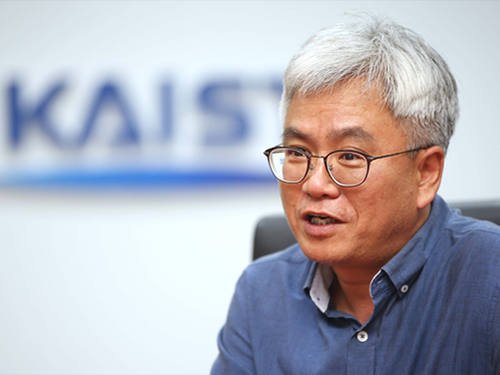 Professor Dae-Sik Im to Head the Science, Technology and Innovation Office at the Ministry of Science & ICT
(Professor Dae-Sik Im of the Department of Biological Sciences)
Professor Dae-Sik Im of the Department of Biological Sciences, a renowned molecular cell biologist, was named to head the Science, Technology and Innovation Office in the Ministry of Science and ICT on August 31. He will be responsible for the oversight of national R&D projects as well as budget deliberation. Joining the KAIST faculty in 2002, he led the Creative Research Center of Cell Division and Differentiation at KAIST.
Announcing the nomination of Professor Im, Cheong Wa Dae spokesman Park Soo-Hyun said, “Professor Im will be the best person to lead the innovation of the research infrastructure system for basic research studies. We believe that his expertise and leadership will make a significant impact in enhancing the nation’s science and technology competitiveness. This vice minister position in the Ministry of Science and ICT was newly created in an effort to enhance national science and technology initiatives by President Moon Jae-In.
Professor Im said at the news conference, “I would like to make a sustainable, as well as credible, system ensuring the ingenuity of scientists in Korean labs. To this end, I will make every effort to enhance Korea’s innovative research environment in a way to maximize research achievements.”
2017.09.03 View 7890
Professor Dae-Sik Im to Head the Science, Technology and Innovation Office at the Ministry of Science & ICT
(Professor Dae-Sik Im of the Department of Biological Sciences)
Professor Dae-Sik Im of the Department of Biological Sciences, a renowned molecular cell biologist, was named to head the Science, Technology and Innovation Office in the Ministry of Science and ICT on August 31. He will be responsible for the oversight of national R&D projects as well as budget deliberation. Joining the KAIST faculty in 2002, he led the Creative Research Center of Cell Division and Differentiation at KAIST.
Announcing the nomination of Professor Im, Cheong Wa Dae spokesman Park Soo-Hyun said, “Professor Im will be the best person to lead the innovation of the research infrastructure system for basic research studies. We believe that his expertise and leadership will make a significant impact in enhancing the nation’s science and technology competitiveness. This vice minister position in the Ministry of Science and ICT was newly created in an effort to enhance national science and technology initiatives by President Moon Jae-In.
Professor Im said at the news conference, “I would like to make a sustainable, as well as credible, system ensuring the ingenuity of scientists in Korean labs. To this end, I will make every effort to enhance Korea’s innovative research environment in a way to maximize research achievements.”
2017.09.03 View 7890 -
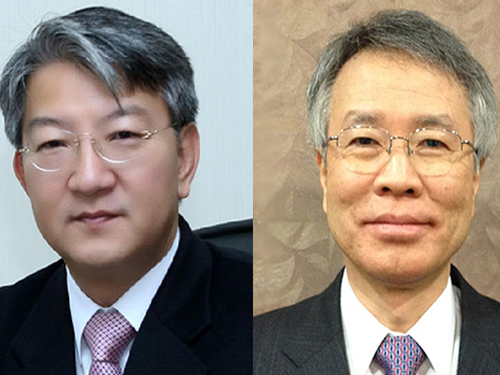 KAIST Professors Sweep the Best Science and Technology Award
(Distinguished Professors Sang Yup Lee (left) and Kyu-Young Whang)
Distinguished Professors Sang Yup Lee from the Department of Chemical and Biomolecular Engineering and Kyu-Young Whang of the College of Computing were selected as the winners of the "2017 Korea Best Science and Technology Award" by the Ministry of Science, ICT and Future Planning (MSIP) and the Korea Federation of Science and Technology Societies.
The award, which was established in 2003, is the highest honor bestowed to the two most outstanding scientists in Korea annually. This is the first time that KAIST faculty members have swept the award since its founding.
Distinguished Professor Lee is renowned for his pioneering studies of system metabolic engineering, which produces useful chemicals by utilizing microorganisms. Professor Lee has developed a number of globally-recognized original technologies such as gasoline production using micro-organisms, a bio-butanol production process, microbes for producing nylon and plastic raw materials, and making native-like spider silk produced in metabolically engineering bacterium which is stronger than steel but finer than human hair.
System metabolism engineering was also selected as one of the top 10 promising technologies in the world in 2016 by the World Economic Forum. Selected as one of the world’s top 20 applied bioscientists in 2014 by Nature Biotechnology, he has many ‘first’ titles in his academic and research careers. He was the first Asian to win the James Bailey Award (2016) and Marvin Johnson Award (2012), the first Korean elected to both the US National Academy of Science (NAS) and the National Academy of Engineering (NAE) this year. He is the dean of KAIST institutes, a multi and interdisciplinary research institute at KAIST. He serves as co-chair of the Global Council on Biotechnology and as a member of the Global Future Council on the Fourth Industrial Revolution at the World Economic Forum.
Distinguished Professor Whang, the first recipient in the field of computer science in this award, has been recognized for his lifetime achievement and contributions to the development of the software industry and the spreading of information culture. He has taken a pioneering role in presenting novel theories and innovative technologies in the field of database systems such as probabilistic aggregation, multidimensional indexing, query, and database and information retrieval. The Odysseus database management system Professor Hwang developed has been applied in many diverse fields of industry, while promoting the domestic software industry and its technical independence.
Professor Hwang is a fellow at the American Computer Society (ACM) and life fellow at IEEE. Professor Whang received the ACM SIGMOD Contributions Award in 2014 for his work promoting database research worldwide, the PAKDD Distinguished Contributions Award in 2014, and the DASFAA Outstanding Contributions Award in 2011 for his contributions to database and data mining research in the Asia-Pacific region. He is also the recipient of the prestigious Korea (presidential) Engineering Award in 2012.
2017.07.03 View 9098
KAIST Professors Sweep the Best Science and Technology Award
(Distinguished Professors Sang Yup Lee (left) and Kyu-Young Whang)
Distinguished Professors Sang Yup Lee from the Department of Chemical and Biomolecular Engineering and Kyu-Young Whang of the College of Computing were selected as the winners of the "2017 Korea Best Science and Technology Award" by the Ministry of Science, ICT and Future Planning (MSIP) and the Korea Federation of Science and Technology Societies.
The award, which was established in 2003, is the highest honor bestowed to the two most outstanding scientists in Korea annually. This is the first time that KAIST faculty members have swept the award since its founding.
Distinguished Professor Lee is renowned for his pioneering studies of system metabolic engineering, which produces useful chemicals by utilizing microorganisms. Professor Lee has developed a number of globally-recognized original technologies such as gasoline production using micro-organisms, a bio-butanol production process, microbes for producing nylon and plastic raw materials, and making native-like spider silk produced in metabolically engineering bacterium which is stronger than steel but finer than human hair.
System metabolism engineering was also selected as one of the top 10 promising technologies in the world in 2016 by the World Economic Forum. Selected as one of the world’s top 20 applied bioscientists in 2014 by Nature Biotechnology, he has many ‘first’ titles in his academic and research careers. He was the first Asian to win the James Bailey Award (2016) and Marvin Johnson Award (2012), the first Korean elected to both the US National Academy of Science (NAS) and the National Academy of Engineering (NAE) this year. He is the dean of KAIST institutes, a multi and interdisciplinary research institute at KAIST. He serves as co-chair of the Global Council on Biotechnology and as a member of the Global Future Council on the Fourth Industrial Revolution at the World Economic Forum.
Distinguished Professor Whang, the first recipient in the field of computer science in this award, has been recognized for his lifetime achievement and contributions to the development of the software industry and the spreading of information culture. He has taken a pioneering role in presenting novel theories and innovative technologies in the field of database systems such as probabilistic aggregation, multidimensional indexing, query, and database and information retrieval. The Odysseus database management system Professor Hwang developed has been applied in many diverse fields of industry, while promoting the domestic software industry and its technical independence.
Professor Hwang is a fellow at the American Computer Society (ACM) and life fellow at IEEE. Professor Whang received the ACM SIGMOD Contributions Award in 2014 for his work promoting database research worldwide, the PAKDD Distinguished Contributions Award in 2014, and the DASFAA Outstanding Contributions Award in 2011 for his contributions to database and data mining research in the Asia-Pacific region. He is also the recipient of the prestigious Korea (presidential) Engineering Award in 2012.
2017.07.03 View 9098 -
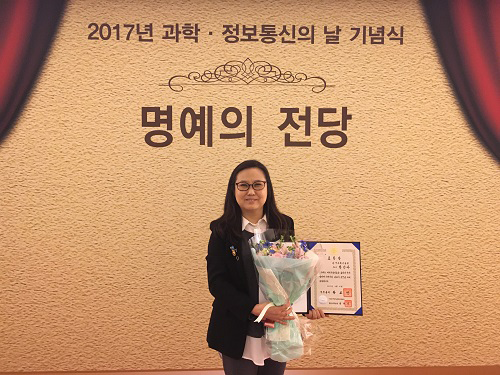 Professor Jinah Park Received the Prime Minister's Award
Professor Jinah Park of the School of Computing received the Prime Minister’s Citation Ribbon on April 21 at a ceremony celebrating the Day of Science and ICT. The awardee was selected by the Ministry of Science, ICT and Future Planning and Korea Communications Commission.
Professor Park was recognized for her convergence R&D of a VR simulator for dental treatment with haptic feedback, in addition to her research on understanding 3D interaction behavior in VR environments. Her major academic contributions are in the field of medical imaging, where she developed a computational technique to analyze cardiac motion from tagging data.
Professor Park said she was very pleased to see her twenty-plus years of research on ways to converge computing into medical areas finally bear fruit. She also thanked her colleagues and students in her Computer Graphics and CGV Research Lab for working together to make this achievement possible.
2017.04.26 View 7903
Professor Jinah Park Received the Prime Minister's Award
Professor Jinah Park of the School of Computing received the Prime Minister’s Citation Ribbon on April 21 at a ceremony celebrating the Day of Science and ICT. The awardee was selected by the Ministry of Science, ICT and Future Planning and Korea Communications Commission.
Professor Park was recognized for her convergence R&D of a VR simulator for dental treatment with haptic feedback, in addition to her research on understanding 3D interaction behavior in VR environments. Her major academic contributions are in the field of medical imaging, where she developed a computational technique to analyze cardiac motion from tagging data.
Professor Park said she was very pleased to see her twenty-plus years of research on ways to converge computing into medical areas finally bear fruit. She also thanked her colleagues and students in her Computer Graphics and CGV Research Lab for working together to make this achievement possible.
2017.04.26 View 7903 -
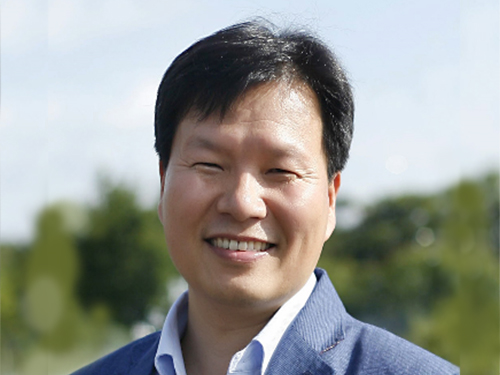 Professor Won Do Heo Receives 'Scientist of the Month Award'
Professor Won Do Heo of the Department of Biological Sciences was selected as the “Scientist of the Month” for April 2017 by the Ministry of Science, ICT and Future Planning and the National Research Foundation of Korea.
Professor Heo was recognized for his suggestion of a new biological research method developing various optogenetics technology which controls cell function by using light. He developed the technology using lasers or LED light, without the need for surgery or drug administration, to identify the cause of diseases related to calcium ions such as Alzheimer’s disease and cancer.
The general technique used in optogenetics, that control cells in the body with light, is the simple activation and deactivation of neurons.
Professor Heo developed a calcium ion channel activation technique (OptoSTIM1) to activate calcium ions in the body using light. He also succeeded in increasing calcium concentrations with light to enhance the memory capacity of mice two-fold.
Using this technology, the desired amount and residing time of calcium ion influx can be controlled by changing light intensity and exposure periods, enabling the function of a single cell or various cells in animal tissue to be controlled remotely.
The experimental results showed that calcium ion influx can be activated in cells that are affected by calcium ions, such as normal cells, cancer cells, and human embryonic stem cells. By controlling calcium concentrations with light, it is possible to control biological phenomena, such as cellular growth, neurotransmitter transmission, muscle contraction, and hormone control.
Professor Heo said, “Until now, it was standard to use optogenetics to activate neurons using channelrhodopsin. The development of this new optogenetic technique using calcium ion channel activation can be applied to various biological studies, as well as become an essential research technique in neurobiology.
The “Scientist of the Month Award” is given every month to one researcher who made significant contributions to the advancement of science and technology with their outstanding research achievement. The awardee will receive prize money of ten million won.
2017.04.07 View 7289
Professor Won Do Heo Receives 'Scientist of the Month Award'
Professor Won Do Heo of the Department of Biological Sciences was selected as the “Scientist of the Month” for April 2017 by the Ministry of Science, ICT and Future Planning and the National Research Foundation of Korea.
Professor Heo was recognized for his suggestion of a new biological research method developing various optogenetics technology which controls cell function by using light. He developed the technology using lasers or LED light, without the need for surgery or drug administration, to identify the cause of diseases related to calcium ions such as Alzheimer’s disease and cancer.
The general technique used in optogenetics, that control cells in the body with light, is the simple activation and deactivation of neurons.
Professor Heo developed a calcium ion channel activation technique (OptoSTIM1) to activate calcium ions in the body using light. He also succeeded in increasing calcium concentrations with light to enhance the memory capacity of mice two-fold.
Using this technology, the desired amount and residing time of calcium ion influx can be controlled by changing light intensity and exposure periods, enabling the function of a single cell or various cells in animal tissue to be controlled remotely.
The experimental results showed that calcium ion influx can be activated in cells that are affected by calcium ions, such as normal cells, cancer cells, and human embryonic stem cells. By controlling calcium concentrations with light, it is possible to control biological phenomena, such as cellular growth, neurotransmitter transmission, muscle contraction, and hormone control.
Professor Heo said, “Until now, it was standard to use optogenetics to activate neurons using channelrhodopsin. The development of this new optogenetic technique using calcium ion channel activation can be applied to various biological studies, as well as become an essential research technique in neurobiology.
The “Scientist of the Month Award” is given every month to one researcher who made significant contributions to the advancement of science and technology with their outstanding research achievement. The awardee will receive prize money of ten million won.
2017.04.07 View 7289 -
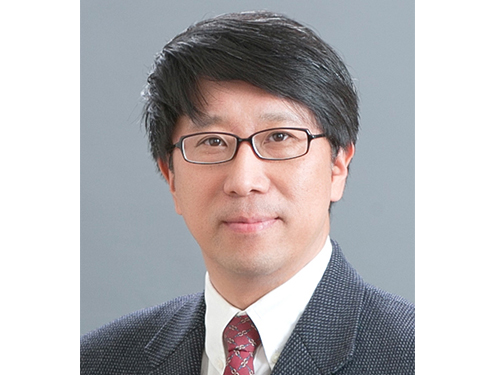 Professor Dongman Lee Wins the 2016 Korea Internet Award
Professor Dongman Lee of KAIST’s School of Computing received the 11th Korea Internet Award in the category of personal achievement on December 13 at the Creative Economy and Innovation Center in Gyeonggi province.
Hosted by the Ministry of Science, ICT and Future Planning of Korea, the Internet Award recognizes leaders in the Internet industry and their contributions.
Since 2010, Professor Lee has conducted research on the Internet of Things (IoT) platforms, resulting in the publication of five research papers in Science Citation Index (SCI) journals, ten papers in Korean journals, 30 best papers nominations at international conferences, and the registration of eleven patents. He has also worked on the creation of an IoT ecosystem through his research on object interworking platforms that can provide diverse user-customized services in the IoT environment.
His research team built a test bed for applicable IoT platforms on the 8th floor of the IT Convergence Center on campus to implement experiments and collect various data, thereby creating a foundation to carry out research projects in this field.
Professor Lee has helped the advancement of an Internet governance system in Korea by researching Internet governance policies, holding important posts in related academic societies including the Chairman of the Korea Internet Governance Alliance (KIGA) Council, and hosting major conferences such as the Asia Pacific Regional Internet Governance Forum (APrIGF).
2016.12.20 View 7060
Professor Dongman Lee Wins the 2016 Korea Internet Award
Professor Dongman Lee of KAIST’s School of Computing received the 11th Korea Internet Award in the category of personal achievement on December 13 at the Creative Economy and Innovation Center in Gyeonggi province.
Hosted by the Ministry of Science, ICT and Future Planning of Korea, the Internet Award recognizes leaders in the Internet industry and their contributions.
Since 2010, Professor Lee has conducted research on the Internet of Things (IoT) platforms, resulting in the publication of five research papers in Science Citation Index (SCI) journals, ten papers in Korean journals, 30 best papers nominations at international conferences, and the registration of eleven patents. He has also worked on the creation of an IoT ecosystem through his research on object interworking platforms that can provide diverse user-customized services in the IoT environment.
His research team built a test bed for applicable IoT platforms on the 8th floor of the IT Convergence Center on campus to implement experiments and collect various data, thereby creating a foundation to carry out research projects in this field.
Professor Lee has helped the advancement of an Internet governance system in Korea by researching Internet governance policies, holding important posts in related academic societies including the Chairman of the Korea Internet Governance Alliance (KIGA) Council, and hosting major conferences such as the Asia Pacific Regional Internet Governance Forum (APrIGF).
2016.12.20 View 7060 -
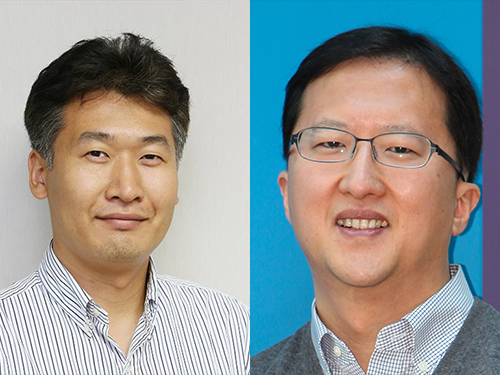 Professors Jeon and Choi Receive the Young Scientist Award
Professors Seokwoo Jeon of the Department of Materials Science and Engineering and Jang Wook Choi of the Graduate School of Energy, Environment, Water and Sustainability (EEWS) at KAIST received the Young Scientist Award.
The award ceremony took place at the Korea Press Center in Seoul. Presented by the Ministry of Science, ICT and Future Planning of Korea and the National Academy of Engineering of Korea, the Young Scientist Award is given to outstanding scientists under the age of 40 who have demonstrated excellence in their research in the field of natural science.
Each year the award is given to three scientists in different areas.
Professor Jeon was recognized for his achievement in creating a new property of materials. He studied synthesis and development of low-dimensional nanomaterials and developed a large area nanostructure.
Professor Choi’s research area was to discover optimal materials for rechargeable batteries. By applying his research, he developed rechargeable batteries with high efficiency, making the wearable system more feasible.
2016.01.11 View 10019
Professors Jeon and Choi Receive the Young Scientist Award
Professors Seokwoo Jeon of the Department of Materials Science and Engineering and Jang Wook Choi of the Graduate School of Energy, Environment, Water and Sustainability (EEWS) at KAIST received the Young Scientist Award.
The award ceremony took place at the Korea Press Center in Seoul. Presented by the Ministry of Science, ICT and Future Planning of Korea and the National Academy of Engineering of Korea, the Young Scientist Award is given to outstanding scientists under the age of 40 who have demonstrated excellence in their research in the field of natural science.
Each year the award is given to three scientists in different areas.
Professor Jeon was recognized for his achievement in creating a new property of materials. He studied synthesis and development of low-dimensional nanomaterials and developed a large area nanostructure.
Professor Choi’s research area was to discover optimal materials for rechargeable batteries. By applying his research, he developed rechargeable batteries with high efficiency, making the wearable system more feasible.
2016.01.11 View 10019 -
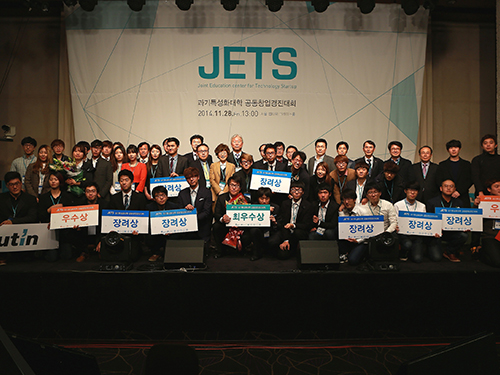 KAIST and Four Science and Technology Universities Host a Start-up Competition
KAIST and four other science and technology universities, such as Gwangju Institute of Science and Technology (GIST), Ulsan National Institute of Science and Technology (UNIST), Daegu Gyeongbuk Institute of Science and Technology (DGIST), and Pohang University of Science and Technology (POSTECH), hosted a startup competition on November 27, 2015 at the Dongdaemun Design Plaza in Seoul.
Approximately 150 participants including students from the five universities, "angel" investors, and entrepreneurs attended the competition.
The competition was held to promote startups that are based on research achievements in science and technology and to foster entrepreneurs with great potential.
Two hundred and sixty applicants from 81 teams competed this year. Only ten teams made it to the finals.
KAIST students presented two business plans: an experience-centered education platform and mobile taxi-pooling service. Students from other universities presented a brain-stimulating simulation software (GIST), handy smart health trainer (GIST), real-time reporting system for luggage (DGIST), a flower delivery system (UNIST), surveillance and alarm system for stock-related events via machinery studies (UNIST), augmented emotion toys using augmented reality (POSTECH), and a nasal spray for fine dust prevention (POSTECH).
KAIST also displayed an exhibition of “wearable haptic device for multimedia contents” and “next generation recommendation service platform based on one-on-one matching system with high expandability and improved user experience system.”
The winning team received an award from the Minister of Science, ICT and Future Planning of Korea, as well as an opportunity to participate in overseas startup programs over the course of ten days.
Joongmyeon Bae, Director of the KAIST Industry and University Cooperation, who organized the contest, said, “The alumni of Stanford University (USA) has annually created over 5.4 million jobs through startup activities. Likewise, we hope that our event will contribute to job creation by fostering innovative entrepreneurs.”
2015.11.26 View 9434
KAIST and Four Science and Technology Universities Host a Start-up Competition
KAIST and four other science and technology universities, such as Gwangju Institute of Science and Technology (GIST), Ulsan National Institute of Science and Technology (UNIST), Daegu Gyeongbuk Institute of Science and Technology (DGIST), and Pohang University of Science and Technology (POSTECH), hosted a startup competition on November 27, 2015 at the Dongdaemun Design Plaza in Seoul.
Approximately 150 participants including students from the five universities, "angel" investors, and entrepreneurs attended the competition.
The competition was held to promote startups that are based on research achievements in science and technology and to foster entrepreneurs with great potential.
Two hundred and sixty applicants from 81 teams competed this year. Only ten teams made it to the finals.
KAIST students presented two business plans: an experience-centered education platform and mobile taxi-pooling service. Students from other universities presented a brain-stimulating simulation software (GIST), handy smart health trainer (GIST), real-time reporting system for luggage (DGIST), a flower delivery system (UNIST), surveillance and alarm system for stock-related events via machinery studies (UNIST), augmented emotion toys using augmented reality (POSTECH), and a nasal spray for fine dust prevention (POSTECH).
KAIST also displayed an exhibition of “wearable haptic device for multimedia contents” and “next generation recommendation service platform based on one-on-one matching system with high expandability and improved user experience system.”
The winning team received an award from the Minister of Science, ICT and Future Planning of Korea, as well as an opportunity to participate in overseas startup programs over the course of ten days.
Joongmyeon Bae, Director of the KAIST Industry and University Cooperation, who organized the contest, said, “The alumni of Stanford University (USA) has annually created over 5.4 million jobs through startup activities. Likewise, we hope that our event will contribute to job creation by fostering innovative entrepreneurs.”
2015.11.26 View 9434 -
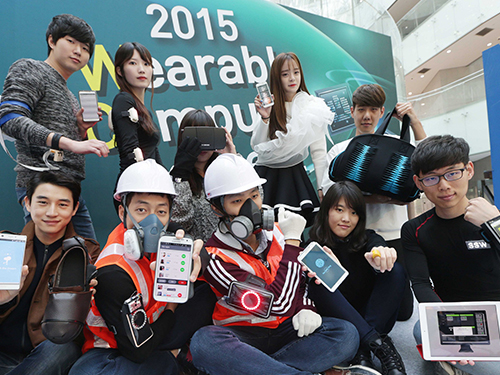 KAIST Hosts the Wearable Computer Contest 2015
“What you see is a compact electronic system on a dust mask, which monitors the amount of dust taken in by a worker and lets other workers know if the person is injured in an industrial site,” said Bum Taek Jung, a Master’s candidate from Sungkyunkwan University during the Wearable Computer Contest 2015 held in KI building of KAIST on November 5, 2015.
He explained his interest in developing this system, “Dust-related respiratory diseases and falling accidents are still prevalent in industrial sites.” He added, “Using the smart dust mask helps monitoring workers’ physical condition in real time, allowing us to cope with accidents in a much more timely manner.” A smart dust mask is a portable device that alerts the user with orange or red light signs when the amount of dust inhaled by the user is higher than the threshold. Its application on a smartphone can also allow project managers to alert the risk of falling accidents to workers by employing a gyroscope and an accelerometer on the mask.
The Wearable Computer Contest 2015 met for the eleventh time at KAIST on November 5-6, 2015. A wearable computer refers to a portable device which users can wear directly on the body or on their clothes while moving. Products that can provide various services by connecting to a smartphone have become increasingly popular. The contest is an excellent opportunity for university students to design creative wearable systems similar to those often depicted in movies and comics.
This year 102 teams from universities all over the nation participated. After screening and evaluation of their presentations, only 8 teams in the product section and 3 teams in the ideas section were selected for the finals. Of the many entries to the contest, the ECG security system caught many people’s attention. The wearable, which attaches to a shirt, acts like an electrocardiogram. By comparing the ECG reading with the one stored in the data server, the wearable can authenticate the user. The system could be widely used by enterprises and financial companies where tight security and authentication are crucial.
The winners of the product and the ideas sections received USD 4,300 and usd 860 respectively along with Minister Prizes from the Minister of Science, ICT and Future Planning of Korea. The Chairman of the contest, Professor Hoi-Jun Yoo from the Electrical Engineering Department of KAIST said, “The contest will be a great opportunity for anyone to have a look at advanced wearable devices developed through close integration of state-of-the-art technologies and creative ideas from young minds.”
2015.11.05 View 7064
KAIST Hosts the Wearable Computer Contest 2015
“What you see is a compact electronic system on a dust mask, which monitors the amount of dust taken in by a worker and lets other workers know if the person is injured in an industrial site,” said Bum Taek Jung, a Master’s candidate from Sungkyunkwan University during the Wearable Computer Contest 2015 held in KI building of KAIST on November 5, 2015.
He explained his interest in developing this system, “Dust-related respiratory diseases and falling accidents are still prevalent in industrial sites.” He added, “Using the smart dust mask helps monitoring workers’ physical condition in real time, allowing us to cope with accidents in a much more timely manner.” A smart dust mask is a portable device that alerts the user with orange or red light signs when the amount of dust inhaled by the user is higher than the threshold. Its application on a smartphone can also allow project managers to alert the risk of falling accidents to workers by employing a gyroscope and an accelerometer on the mask.
The Wearable Computer Contest 2015 met for the eleventh time at KAIST on November 5-6, 2015. A wearable computer refers to a portable device which users can wear directly on the body or on their clothes while moving. Products that can provide various services by connecting to a smartphone have become increasingly popular. The contest is an excellent opportunity for university students to design creative wearable systems similar to those often depicted in movies and comics.
This year 102 teams from universities all over the nation participated. After screening and evaluation of their presentations, only 8 teams in the product section and 3 teams in the ideas section were selected for the finals. Of the many entries to the contest, the ECG security system caught many people’s attention. The wearable, which attaches to a shirt, acts like an electrocardiogram. By comparing the ECG reading with the one stored in the data server, the wearable can authenticate the user. The system could be widely used by enterprises and financial companies where tight security and authentication are crucial.
The winners of the product and the ideas sections received USD 4,300 and usd 860 respectively along with Minister Prizes from the Minister of Science, ICT and Future Planning of Korea. The Chairman of the contest, Professor Hoi-Jun Yoo from the Electrical Engineering Department of KAIST said, “The contest will be a great opportunity for anyone to have a look at advanced wearable devices developed through close integration of state-of-the-art technologies and creative ideas from young minds.”
2015.11.05 View 7064 -
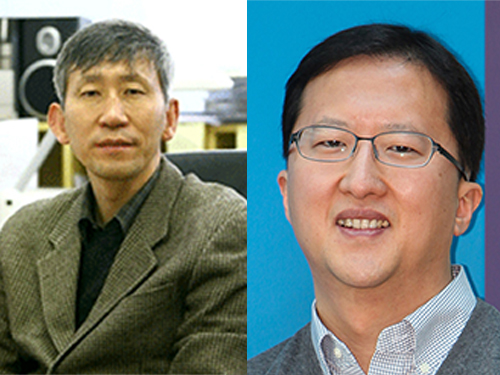 Professors Sukbok Chang and Jang-Wook Choi Receive the 2015 Knowledge Award from the Korean Government
The Ministry of Science, ICT and Future Planning (MISP) of the Republic of Korea announced the 2015 Knowledge Awards on October 20, 2015. Two KAIST professors received the award.
Established in 2009, the awards are presented to Korean scientists whose publications have contributed to the international science community. Specifically, the MISP used the two biggest science databases, Science Citation Index Expanded (SCIE) and Scopus, to identify ten highly cited papers ranked in the top 1% by total citations in the past ten years.
Professor Sukbok Chang of Chemistry (left in the picture below) is a global authority in the field of catalytic hydrocarbon functionalization. His paper entitled “Palladium-catalyzed C-H Functionalization of Pyridine N-Oxides: Highly Selective Alkenylation and Direct Arylation with Unactivated Arenes,” which was published in the Journal of the American Chemical Society in 2008, was once selected by Thomson Reuters as one of the “Most Influential Research Papers of the Month.” In 2011, the American Chemical Society included his paper in the list of the top 20 research papers that were most frequently cited in the last three years.
Professor Jang-Wook Choi of the Graduate School of EEWS (Energy, Environment, Water, and Sustainability) has been known for his leading research in rechargeable battery, supercapacitor, and materials chemistry. In particular, his work on secondary fuel cells attracted significant attention from academia and industry in Korea. Professor Choi developed a super-thin flexible lithium-ion battery this year, thinner than a credit card, which lasts longer than the existing batteries and with greater performance. He also developed new electrode materials for next-generation sodium-ion and magnesium secondary fuel cells.
Professor Sukbok Chang (left) and Professor Jang-Wook Choi (right)
2015.10.23 View 9881
Professors Sukbok Chang and Jang-Wook Choi Receive the 2015 Knowledge Award from the Korean Government
The Ministry of Science, ICT and Future Planning (MISP) of the Republic of Korea announced the 2015 Knowledge Awards on October 20, 2015. Two KAIST professors received the award.
Established in 2009, the awards are presented to Korean scientists whose publications have contributed to the international science community. Specifically, the MISP used the two biggest science databases, Science Citation Index Expanded (SCIE) and Scopus, to identify ten highly cited papers ranked in the top 1% by total citations in the past ten years.
Professor Sukbok Chang of Chemistry (left in the picture below) is a global authority in the field of catalytic hydrocarbon functionalization. His paper entitled “Palladium-catalyzed C-H Functionalization of Pyridine N-Oxides: Highly Selective Alkenylation and Direct Arylation with Unactivated Arenes,” which was published in the Journal of the American Chemical Society in 2008, was once selected by Thomson Reuters as one of the “Most Influential Research Papers of the Month.” In 2011, the American Chemical Society included his paper in the list of the top 20 research papers that were most frequently cited in the last three years.
Professor Jang-Wook Choi of the Graduate School of EEWS (Energy, Environment, Water, and Sustainability) has been known for his leading research in rechargeable battery, supercapacitor, and materials chemistry. In particular, his work on secondary fuel cells attracted significant attention from academia and industry in Korea. Professor Choi developed a super-thin flexible lithium-ion battery this year, thinner than a credit card, which lasts longer than the existing batteries and with greater performance. He also developed new electrode materials for next-generation sodium-ion and magnesium secondary fuel cells.
Professor Sukbok Chang (left) and Professor Jang-Wook Choi (right)
2015.10.23 View 9881 -
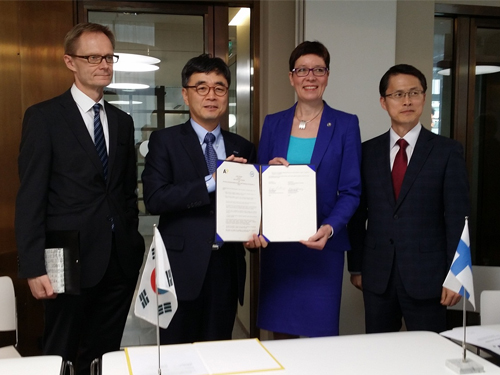 KAIST to Kick-Start the Exchange of Young Researchers with Northern European Universities
KAIST promotes research exchange and cooperation with three universities in Northern Europe.
KAIST has signed a letter of intent (LOI) for the mutual exchange of young researchers and cooperation to collaborate with KTH Royal Institute of Technology and Lund University, both based in Sweden on June 2, 2015, and with Aalto University in Finland on June 4, 2015.
This LOI was the result of the cooperative projects of Korea-Sweden and Korea-Finland Joint Committees on Science and Technology supervised by the Ministry of Science, ICT and Future Planning of Korea.
As agreed in the LOI, KAIST will conduct joint research projects with the three universities by providing students and researchers with opportunities to visit each other through internship programs and workshops and by sharing information on education and research.
Sung-Hyon Mayeng, the Associate Vice President of the International Relations Office at KAIST, said, “It’s an encouraging sign that universities and governments recognize the importance of increasing exchanges among academic and research communities. Expecting more vibrant relationships to be formed between KAIST and the three northern European universities in coming years, I hope that today’s agreement becomes a good basis to spur technological innovations that will not only benefit the regions but also the world.”
Established in 1827, the KTH Royal Institute of Technology is the largest and oldest technical university in Sweden, accounting for one-third of the nation’s technical research and engineering education capacity at university level. The university offers education and research programs from natural sciences to all branches of engineering including architecture, industrial management, and urban planning. According to the QS World University Rankings in 2014, KTH Royal Institute of Technology ranked 27th in engineering and 1st in Northern Europe.
Lund University, Sweden, is one of the oldest and most prestigious universities in northern Europe, consistently ranking among the world’s top 100 universities. In particular, its biological sciences and engineering have shown great strength, placing within the top 60 universities by the Times Higher Education (THE) World University Rankings. The university also receives the largest amount of research funding from the Swedish government.
Aalto University in Finland was created as a merger of three leading Finnish universities: the Helsinki University of Technology (established 1849), the Helsinki School of Economics (established 1904), and the University of Art and Design Helsinki (established 1871). The university nurtures the close collaborations across science, business, and arts to foster multi-disciplinary education and research.
2015.06.04 View 7331
KAIST to Kick-Start the Exchange of Young Researchers with Northern European Universities
KAIST promotes research exchange and cooperation with three universities in Northern Europe.
KAIST has signed a letter of intent (LOI) for the mutual exchange of young researchers and cooperation to collaborate with KTH Royal Institute of Technology and Lund University, both based in Sweden on June 2, 2015, and with Aalto University in Finland on June 4, 2015.
This LOI was the result of the cooperative projects of Korea-Sweden and Korea-Finland Joint Committees on Science and Technology supervised by the Ministry of Science, ICT and Future Planning of Korea.
As agreed in the LOI, KAIST will conduct joint research projects with the three universities by providing students and researchers with opportunities to visit each other through internship programs and workshops and by sharing information on education and research.
Sung-Hyon Mayeng, the Associate Vice President of the International Relations Office at KAIST, said, “It’s an encouraging sign that universities and governments recognize the importance of increasing exchanges among academic and research communities. Expecting more vibrant relationships to be formed between KAIST and the three northern European universities in coming years, I hope that today’s agreement becomes a good basis to spur technological innovations that will not only benefit the regions but also the world.”
Established in 1827, the KTH Royal Institute of Technology is the largest and oldest technical university in Sweden, accounting for one-third of the nation’s technical research and engineering education capacity at university level. The university offers education and research programs from natural sciences to all branches of engineering including architecture, industrial management, and urban planning. According to the QS World University Rankings in 2014, KTH Royal Institute of Technology ranked 27th in engineering and 1st in Northern Europe.
Lund University, Sweden, is one of the oldest and most prestigious universities in northern Europe, consistently ranking among the world’s top 100 universities. In particular, its biological sciences and engineering have shown great strength, placing within the top 60 universities by the Times Higher Education (THE) World University Rankings. The university also receives the largest amount of research funding from the Swedish government.
Aalto University in Finland was created as a merger of three leading Finnish universities: the Helsinki University of Technology (established 1849), the Helsinki School of Economics (established 1904), and the University of Art and Design Helsinki (established 1871). The university nurtures the close collaborations across science, business, and arts to foster multi-disciplinary education and research.
2015.06.04 View 7331 -
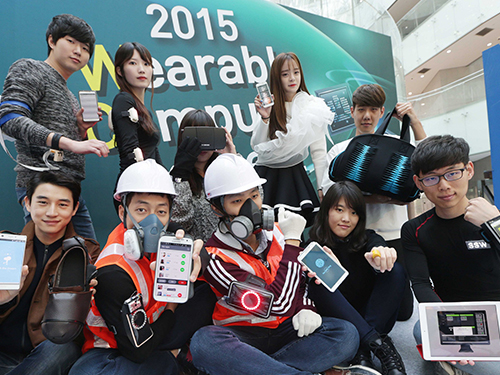 KAIST Hosts the Wearable Computer Contest 2015
Deadlines for Prototype Contest by May 30, 2015 and August 15 for Idea Contest
KAIST will hold the Wearable Computer Contest 2015 in November, which will be sponsored by Samsung Electronics Co., Ltd.
Wearable computers have emerged as next-generation mobile devices, and are gaining more popularity with the growth of the Internet of Things. KAIST has introduced wearable devices such as K-Glass 2, a smart glass with augmented reality embedded. The Glass also works on commands by blinking eyes.
This year’s contest with the theme of “Wearable Computers for Internet of Things” is divided into two parts: the Prototype Competition and Idea Contest.
With the fusion of information technology (IT) and fashion, contestants are encouraged to submit prototypes of their ideas by May 30, 2015. The ten teams that make it to the finals will receive a wearable computer platform and Human-Computer Interaction (HCI) education, along with a prize of USD 1,000 for prototype production costs. The winner of the Prototype Contest will receive a prize of USD 5,000 and an award from the Minister of Science, ICT and Future Planning (MSIP) of the Republic of Korea.
In the Idea Contest, posters containing ideas and concepts of wearable devices should be submitted by August 15, 2015. The teams that make it to the finals will have to display a life-size mockup in the final stage. The winner of the contest will receive a prize of USD 1,000 and an award from the Minister of MSIP.
Any undergraduate or graduate student in Korea can enter the Prototype Competition and anyone can participate in the Idea Contest.
The chairman of the event, Hoi-Jun Yoo, a professor of the Department of Electrical Engineering at KAIST, noted:
“There is a growing interest in wearable computers in the industry. I can easily envisage that there will be a new IT world where wearable computers are integrated into the Internet of Things, healthcare, and smart homes.”
More information on the contest can be found online at http://www.ufcom.org.
Picture: Finalists in the last year’s contest
2015.05.11 View 7159
KAIST Hosts the Wearable Computer Contest 2015
Deadlines for Prototype Contest by May 30, 2015 and August 15 for Idea Contest
KAIST will hold the Wearable Computer Contest 2015 in November, which will be sponsored by Samsung Electronics Co., Ltd.
Wearable computers have emerged as next-generation mobile devices, and are gaining more popularity with the growth of the Internet of Things. KAIST has introduced wearable devices such as K-Glass 2, a smart glass with augmented reality embedded. The Glass also works on commands by blinking eyes.
This year’s contest with the theme of “Wearable Computers for Internet of Things” is divided into two parts: the Prototype Competition and Idea Contest.
With the fusion of information technology (IT) and fashion, contestants are encouraged to submit prototypes of their ideas by May 30, 2015. The ten teams that make it to the finals will receive a wearable computer platform and Human-Computer Interaction (HCI) education, along with a prize of USD 1,000 for prototype production costs. The winner of the Prototype Contest will receive a prize of USD 5,000 and an award from the Minister of Science, ICT and Future Planning (MSIP) of the Republic of Korea.
In the Idea Contest, posters containing ideas and concepts of wearable devices should be submitted by August 15, 2015. The teams that make it to the finals will have to display a life-size mockup in the final stage. The winner of the contest will receive a prize of USD 1,000 and an award from the Minister of MSIP.
Any undergraduate or graduate student in Korea can enter the Prototype Competition and anyone can participate in the Idea Contest.
The chairman of the event, Hoi-Jun Yoo, a professor of the Department of Electrical Engineering at KAIST, noted:
“There is a growing interest in wearable computers in the industry. I can easily envisage that there will be a new IT world where wearable computers are integrated into the Internet of Things, healthcare, and smart homes.”
More information on the contest can be found online at http://www.ufcom.org.
Picture: Finalists in the last year’s contest
2015.05.11 View 7159